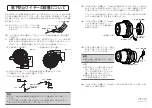
23
Mode Settings
1
1
3
3
2
2
Setting the shutter speed using DIP switches
◆
HD/VD input
• Continuous VD input
*1 This is an external input signal. Make sure to input
both HD and VD signals.
*2 The exposure time (Te) is determined by the
setting of DIP switches.
For details, see page 17.
*3 Normal operation is resumed when the trigger
pulse width is 1/3 s or more. The trigger falling
edge restores external trigger shutter operation. At
this time, the 50 ms after the falling edge of the
trigger pulse is an external trigger input inhibition
area. There is no guarantee of operation for any
trigger input in this period.
External trigger shutter operation
Normal
operation
*
3
Mode transition state
External input
inhibition area
(50 ms)
External trigger
shutter operation
Exposure time (Te)
*
2
Exposure time
(Te)
*
2
Trigger pulse width
*
3
T: T=under 10 ms*
4
525 H (Bining OFF)
263 H (Bining ON)
Exposure time (Te)
*
2
2
µ
s to 250 ms
T: T=10 ms or more
*
4
T: T=10 ms or
more
*
4
Trigger
*
1
External HD
*
1
Video out
WEN
External VD
*
1
(Continuous
VD)
*4 An image is output when an external VD signal
falls 10 ms or more after a trigger pulse rises (
2
and
3
in the figure). If the period from the trigger
rising edge to the external VD falling edge (T in
the figure) is under 10 ms, it is not defined whether
the image is output for the external VD falling
edge or the image is output for the next external
VD falling edge. (
1
in the figure shows that the
image is output for the next external VD). In this
case, see WEN since the image and WEN make up
a pair.
Note
An image is not output correctly when the next trigger
is input before the image for the previous trigger has
been output.









































